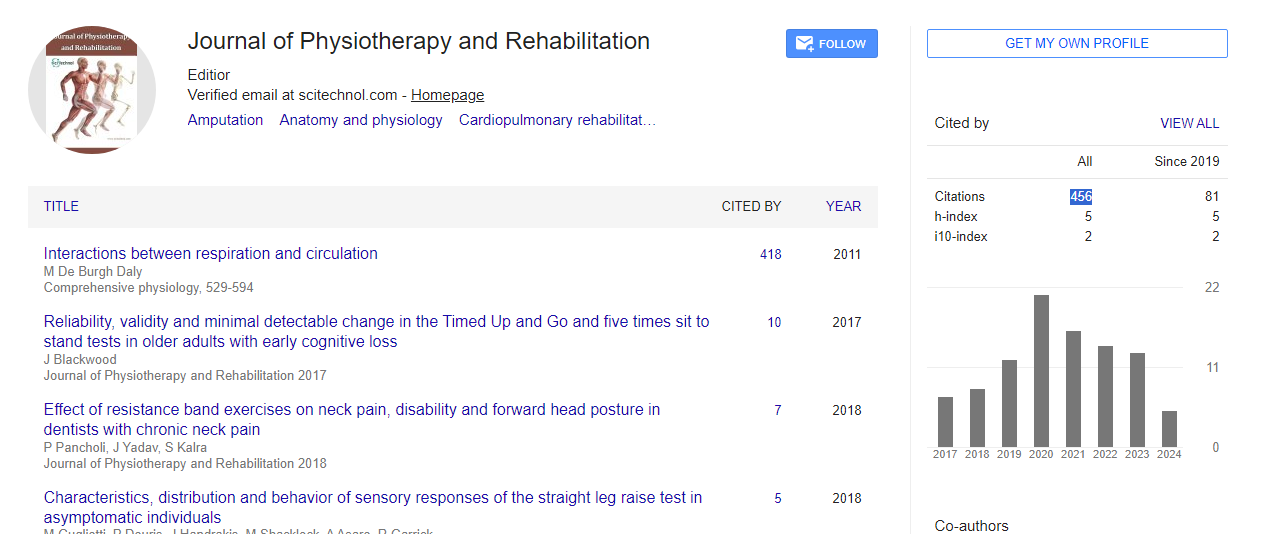Opinion Article, J Physiother Rehabi Vol: 7 Issue: 3
Geriatric Rehabilitation in Enhancing Quality of Life
Barnhoorn Groenewegen*
1Department of General Practice and Old Age Medicine, Amsterdam University Medical Centers, Amsterdam, The Netherlands
*Corresponding Author: Barnhoorn Groenewegen,
Department of General
Practice and Old Age Medicine, Amsterdam University Medical Centers,
Amsterdam, The Netherlands
E-mail: barngroen@aumc.nl
Received date: 22 May, 2023, Manuscript No. JPTR-23-104297;
Editor assigned date: 25 May, 2023, Pre QC. JPTR-23-104297 (PQ);
Reviewed date: 08 June, 2023, QC No. JPTR-23-104297;
Revised date: 15 June, 2023, Manuscript No. JPTR-23-104297 (R);
Published date: 22 June, 2023, DOI: 10.4172/JPTR.1000141
Citation: Groenewegen B (2023) Geriatric Rehabilitation in Enhancing Quality of Life. J Physiother Rehabi 7:3.
Description
Geriatric rehabilitation plays a vital role in supporting the independence and improving the quality of life for older adults. As individuals age, they may face various physical, functional and cognitive challenges that can impact their ability to perform daily activities and maintain their independence. Geriatric rehabilitation focuses on addressing these issues through comprehensive and personalized interventions, enabling older adults to regain and maintain their functional abilities. The significance of geriatric rehabilitation in promoting elder independence is discussed, which also emphasizes various approaches and interventions used in this field of rehabilitation.
Supporting the elder independence
The challenges of aging: The common challenges that older adults face, includes decreased strength, balance and coordination issues, chronic conditions, cognitive impairments and the age-related changes in mobility and flexibility. It emphasizes the impact of these challenges on the independence and overall well-being of older individuals.
The role of geriatric rehabilitation: The key role that geriatric rehabilitation plays in supporting elder independence emphasizes the multidisciplinary approach of geriatric rehabilitation, involving physiotherapists, occupational therapists, speech therapists and other healthcare professionals. The primary goal is to optimize functional abilities, enhance mobility and improve overall quality of life.
Comprehensive geriatric assessment: A comprehensive geriatric assessment is a fundamental component of geriatric rehabilitation. The importance of assessing physical, cognitive and psychosocial aspects of an older adult's health to develop personalized rehabilitation plans highlights the interdisciplinary collaboration in conducting thorough assessments.
Physical rehabilitation interventions: The various physical rehabilitation interventions employed in geriatric rehabilitation covers strength and resistance training, balance and gait training, flexibility exercises and cardiovascular conditioning. It emphasizes the benefits of these interventions in improving functional abilities, reducing fall risks and enhancing overall physical health.
Cognitive rehabilitation strategies: Cognitive impairments are common among older adults and can significantly impact their independence. This section explores cognitive rehabilitation strategies used in geriatric rehabilitation, such as memory training, attention and concentration exercises and problem-solving techniques. It emphasizes the importance of maintaining cognitive function to support daily activities and decision-making.
Assistive devices and technology: Assistive devices and technology play a vital role in geriatric rehabilitation by promoting independence and compensating for functional limitations. This section discusses various assistive devices, such as mobility aids, adaptive equipment and environmental modifications. It also explores the integration of technology, including gadgets and smart home technologies, to support older adults in their daily activities.
Psychosocial support and mental health: Geriatric rehabilitation recognizes the importance of addressing psychosocial and mental health aspects of older adults' well-being. This section highlights the role of counseling, support groups and psychological interventions in promoting emotional well-being and social engagement among older adults.
Conclusion
Geriatric rehabilitation is an essential component of supporting elder independence and enhancing their quality of life. By integrating physical, cognitive, and psychosocial aspects, geriatric rehabilitation helps older adults regain and maintain functional abilities, allowing people to live independently and actively participate in daily activities. The comprehensive and personalized approach of geriatric rehabilitation ensures that the unique needs of older individuals are met, promoting their overall well-being and maximizing their independence.
 Spanish
Spanish  Chinese
Chinese  Russian
Russian  German
German  French
French  Japanese
Japanese  Portuguese
Portuguese  Hindi
Hindi 